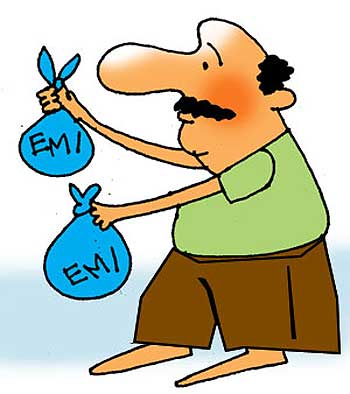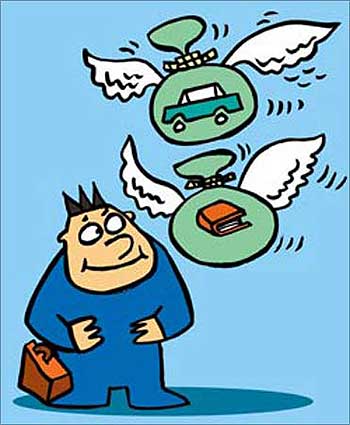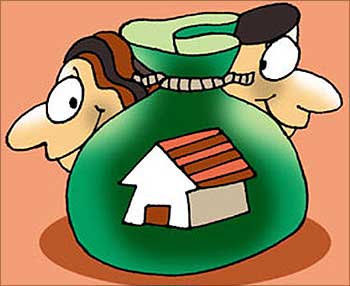
This loan account can be closed in three ways. First, you regularly service the loan during the entire course of the loan tenure. Second, you make windfall gains and use the extra funds to foreclose the loan account. Third, you get your loan refinanced by a lender offering cheaper rates than your existing lender. Here, we will go into details of the first two.
How to close a loan?
Paying off as per the amortisation schedule. Of late, banks have become proactive and would send the necessary papers to you once a loan account is closed. The documents would attest that you are technically debt-free.
If the bank does not send these documents, call its customer service department and find out about the status of your loan account. You can find the loan account number in the amortisation schedule that the lending institution would have sent to you after disbursing the loan.
If you are unable to locate the document, request the customer service department for it. You may have to share your personal details to get the number. You can also approach the branch from where your loan was sanctioned and give them a requisition in writing to locate your loan account number. The lending institution will verify your details and then provide you the requested information.

Foreclose a loan only if the prepayment penalty is less than the interest saved.
Call the bank's customer service department or get in touch with the concerned branch. Find out the amount you would need to pay to foreclose it. Ensure that this amount includes the principal outstanding, prepayment penalty, if applicable, and the necessary service charges.
Sujai Raina, business manager (personal loans and business loans), HDFC Bank says "The customer is given a letter stating the amount to be repaid. This would include the principal amount, interest, foreclosure charges and other charges." Also, find out the period within which you can pay this amount and the location where you need to pay it.
There is some amount of paperwork involved while closing a loan.

Paperwork
For car loan the bank will typically send you a list of documents within 15-20 days of the payment. It will send you an NOC stating that you have duly paid the loan and there is no amount outstanding against your name. The bank will also send you a letter for the regional transport office and the insurance company stating that you have paid off the loan.
To get the hypothecation removed from your car's registration certificate/book, you will need to submit the original letter along with your residence proof at the office of the Regional Transport Officer.
Remember that the RTO office accepts only a select list of documents as proof of residence. This list is displayed at the RTO office. Once you submit the papers, you will receive an acknowledgement slip. The RTO office will take 10-20 working days to give you the new registration certificate. Till that time, the acknowledgement slip will suffice for the registration certificate.
You will also need to submit the bank's letter addressed to the insurance company from the branch office where you got your car insured. The insurer will give you an endorsement for the same.
Says A.N. Raju, executive director, Sundaram Finance: "The endorsement on the RC has to be removed after the loan has been repaid. This is very important since this is compulsory when selling the car later. The removal will mean that the car is clear of all charges." The relevant change will appear when you get the insurance renewed.

Home loan
Before the loan was sanctioned to you, the bank/lending institution would have asked you for a list of documents, including your property papers. Once the loan has been paid in full, the bank/lending institution will return these.
You need to ensure that you take back all the documents that you had submitted to the bank/lending institution. The bank/institution will then issue you a letter stating the said property is free from mortgage.
When you had taken the loan, the bank would have most likely asked you to furnish guarantors. The bank will also issue separate letters to these guarantors stating that their liability has come to an end as the loan has been repaid in full.
Only after you receive these documents can you say that the property is completely free of mortgage. Further, the bank/lending institution will also send a no-dues letter to the cooperative society/government agency from which you bought the house.
Remember to get an acknowledgment for the last EMI cheque. You will get your documents as soon as the cheque gets cleared. If this process takes more than two weeks, follow up with the bank. Aditi Sanzgiri, manager (retail banking), Saraswat Cooperative Bank says: "Cooperative banks collect the final EMI in cash too. We give the documents on the spot."

Personal loan
Once you have paid the loan in full, the bank will send you a letter stating that there is no amount outstanding against your name.
Why closure matters?
There are several reasons why you need to close a loan.
First, it is a proof that you have paid off the loan and there is no amount outstanding against your name. With credit appraisals becoming more scientific, it's in your interest to keep your track record clean.
Second, if the loan was taken to acquire assets like a home or a car, then proper closing of the loan attests that your equity in that particular asset is 100 per cent. This facilitates easy sale of the asset when required.
While closing any line of credit, make sure that you keep a copy of the letters that you submit in the relevant office. For example, if you submit the NOC letter from the lending institution at the RTO, make sure you keep a copy of the same for your record. After all, it's in your interest to keep your track record clean.